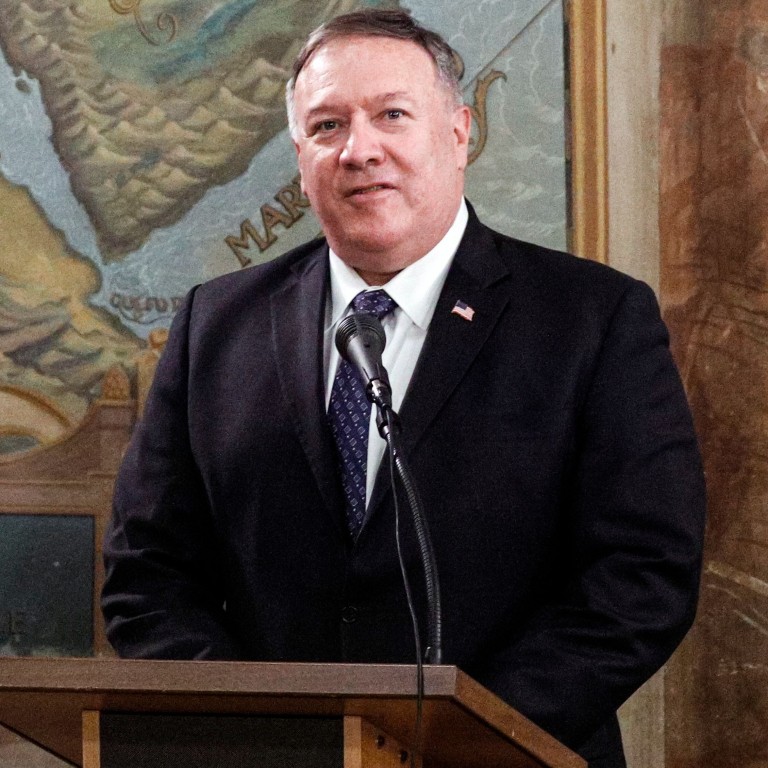
Mike Pompeo keeps up pressure on China despite cutting short Asia trip after Donald Trump’s coronavirus positive
- US Secretary of State will still meet counterparts from Japan, India and Australia, the other members of the so-called Quad
- His Asia tour, although shortened, will raise concerns about China’s growing strategic influence abroad
US Secretary of State Mike Pompeo has cut short his Asia trip after Donald Trump and other senior officials tested positive for Covid-19.
However, he has cancelled plans to visit South Korea and Mongolia.
Shi Yinhong, an international relations expert from Renmin University in Beijing, said Pompeo’s shortened trip to Asia would not change the anti-China “new normal” heralded by the Trump administration.
“The big picture remains the same that the US is pushing the Quad as a new frontline to go against China,” Shi said.
“The US will actively form and enhance anti-China alliances with other countries in the region – Mongolia, for instance, may build closer ties with Japan and the US in the future,” he said.
Pang Zhongying, a specialist in international relations at Ocean University of China, said: “There are reasons for Pompeo to visit Japan despite Trump’s infection, such as Japan has a new Prime Minister and the Quad meeting in Japan. Regardless of his itinerary change, Trump’s major foreign policies will continue, and this include partnering more regional countries to counter Chinese influence.”
Beijing has lashed out at Pompeo in particular for “playing up his ‘China threat’ theory around the world”, as he sounds the alarm globally on issues such as the sustainability of Chinese investments and security of Chinese technology.

01:28
US State Secretary Mike Pompeo urges Vatican to reject China's human rights abuses
Yun Sun, a senior fellow at Washington-based Stimson Centre, said: “Beijing sees US criticisms of China as motivated by ulterior motives, that it’s not about whether what China does is right or wrong, but about the US desire to undermine China’s influence.”
Monika Chansoria, senior fellow at The Japan Institute of International Affairs in Tokyo, said this was reflected by India’s deployment of a warship into the South China Sea in August, in the midst of an ongoing crisis at the disputed China-India border since June.
Japan’s Prime Minister Yoshihide Suga reportedly has plans to visit Vietnam and Indonesia in October as his first overseas trips in his new role, indicating a focus on Southeast Asia and the South China Sea.
Vietnam: Beijing’s South China Sea drills may hurt maritime code talks
“It could be the beginning of a far more robust approach undertaken throughout the Indo-Pacific by these countries, jointly along with their respective regional partners,” Chansoria said. “The post-Covid-19 world is increasingly going to see an overhauled reassessment of China with wider security implications.”

00:54
New video of huge blast at inter-Korean liaison office released by North's state media
Despite the cancellation of Pompeo’s visit to Mongolia, relations between Mongolia and China have been badly affected by Beijing’s language policies in Inner Mongolia.
The decision to replace to Mongolian language classes in key subjects with Mandarin has prompted a wave of protests in the Chinese region and extensive criticism in Mongolia.
The country’s former president Tsakhiagiin Elbegdorj wrote to President Xi Jinping to protest against the move, saying it was a “growing atrocity that seeks to dissolve and eliminate Mongolians as an independent ethnicity through their language”.
Pompeo gets Italian promise on 5G security but fails on Vatican-China deal
Oyunsuren Damdinsuren, senior lecturer at the National University of Mongolia, said that while the US was considered to be Mongolia’s “most important third neighbour” after China and Russia, US foreign investment and foreign trade with the country was still negligible. If Pompeo had visited, it would have been an important sign of symbolic support for Mongolia’s democracy, she said.


